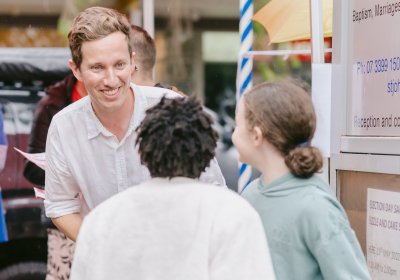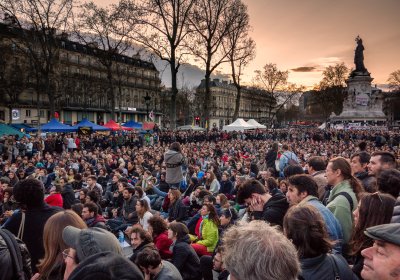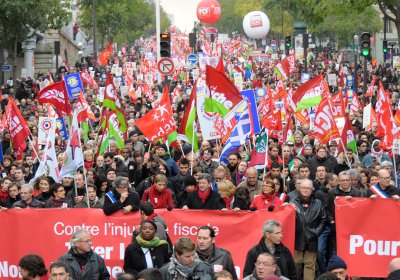At the heart of the Brisbane Greenslide was a strategy of combining electoral campaigning with social organising. Australian Greens’ Griffith campaign manager Liam Flenady outlines how they laid the groundwork for this breakthrough victory by the radical left.
Liam Flenady
Defying predictions, the Greens look set to win 2 seats in Brisbane and are in the running for another. Liam Flenady, the Australian Greens’ campaign manager for the seat of Griffith, reflects on three reasons why the campaign was so successful.
Anyone following French politics in recent years should not be surprised by the recent explosion of public protest and resistance across the country. For years, France has simmered with a combination of a deeply unpopular government, a limping economy and a struggling, fed up populace.
As the initial horror and outrage of the attacks in Paris on November 13 subside, the impacts they are already having on French and European society are becoming clearer.
A state of emergency has been declared by the French government and will persist for up to three months.
French officials announced on November 17 that France would see an extra 115,000 police officers, gendarmes and soldiers deployed across the country.
In this context, rational debate is being restricted and progressive movements are on the defensive.
Refugees
 More than 85 people, including children, drowned or went missing near the Greek Islands Lesbos, Samos, Kalymnos and Rhodes between October 28 and 30.
As numbers, these deaths are added to the more than 3400 who have already died trying to flee to Europe so far this year. As human lives, these represent an incalculable loss and moral failure by European leaders.
More than 85 people, including children, drowned or went missing near the Greek Islands Lesbos, Samos, Kalymnos and Rhodes between October 28 and 30.
As numbers, these deaths are added to the more than 3400 who have already died trying to flee to Europe so far this year. As human lives, these represent an incalculable loss and moral failure by European leaders.
 Activists from France's Left Front. The Left Front is divided by strategic debates over how to confront Europe-wide austerity.
Five key figures of the European left have launched a new initiative “for a Plan B in Europe”.
Activists from France's Left Front. The Left Front is divided by strategic debates over how to confront Europe-wide austerity.
Five key figures of the European left have launched a new initiative “for a Plan B in Europe”.
 30,000 people marched in Vienna on August 31 to demonstrate against inhumane treatment of refugees.
In less than a fortnight a series of tragedies took place on the borders of Europe, spurring a continent-wide debate over refugee policy.
On August 26, about 200 refugees perished at sea as their ship capsized off the coast of Libya on its way to Italy.
30,000 people marched in Vienna on August 31 to demonstrate against inhumane treatment of refugees.
In less than a fortnight a series of tragedies took place on the borders of Europe, spurring a continent-wide debate over refugee policy.
On August 26, about 200 refugees perished at sea as their ship capsized off the coast of Libya on its way to Italy.
In the aftermath of the harsh deal for brutal austerity and mass privatisation imposed on Greece in the early hours of July 13, both Berlin and Paris are floating alternative “solutions” to the euro problem.
Germany, on the one hand, wants greater fiscal integration, whereas France is calling for the creation of a eurozone government as well as a dedicated finance minister.
The mainstream press is talking up the divisions between the two nations as fundamentally different perspectives on the euro — or even differences in political “culture”.
The message from the mainstream media and parties across Europe is Greece is to blame for its own predicament. But a growing grass-roots movement across the continent is pushing for an alternative approach that demands democracy, not austerity.
In a speech to the Belgian parliament on June 10, conservative Belgian Prime Minister Charles Michel declared that “the end of the Greek holiday has sounded.”
French politics further confirmed its rightward trajectory after the second round of departmental elections on March 29.
There are 101 departments and 4108 councillor positions across the country. Departments are in charge of local roads, school buildings and buses, welfare allowances and various other local issues. But the elections also represent a barometer of the political situation in the country.
The governing nominally centre-left Socialist Party (PS) suffered a humiliating defeat against a right-wing united front headed by the centre-right Union for a Popular Movement (UMP).
More than 3.5 million people took to the streets of France on January 11 to support free speech and honour the victims of terrorist attacks on the offices of satirical magazine Charlie Hedbo and other targets that left 17 people dead, as well as three suspects.
- Page 1
- Next page






 More than 5000 people rallied in Brussels on June 21.
More than 5000 people rallied in Brussels on June 21.

